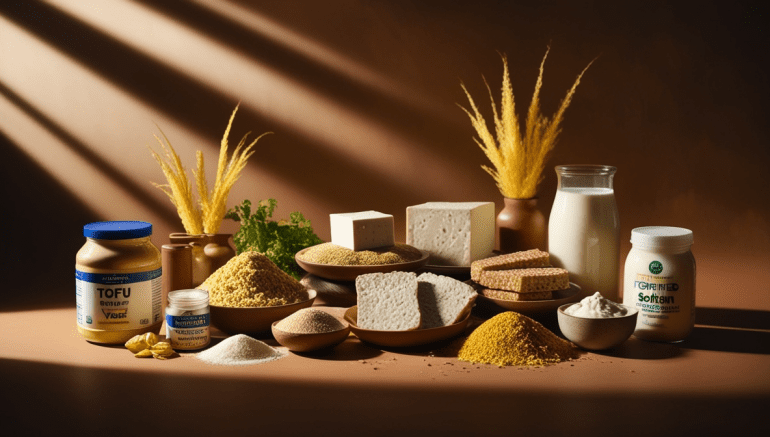Vitamin B12 is essential for nerve health, DNA synthesis, and red blood cell formation. While it’s naturally abundant in animal products, vegans need to be mindful of getting B12 from other sources. Below, we’ll explore why B12 is important, discuss the best vegan-friendly options, and offer tips for meeting your daily requirements.
Why Do You Need Vitamin B12?
Vitamin B12 supports brain function, nerve health, and energy production. A deficiency in B12 can lead to fatigue, neurological issues, and even anemia over time. For adults, the recommended daily intake is about 2.4 micrograms, though pregnant and breastfeeding individuals may need slightly more.
The Challenge for Vegans
Most B12 comes from bacteria and fungi that exist in soil, water, and animal guts. Animal products accumulate B12 from these sources, but since modern farming and food sanitization practices remove B12-rich bacteria from plant-based foods, vegans need to rely on fortified foods and supplements.
Top Vegan Sources of Vitamin B12
Here are the most reliable ways for vegans to meet their B12 requirements:
1. Fortified Plant-Based Milks
- Options: Fortified almond, soy, oat, and rice milk.
- B12 Content: Typically provides 0.5–3 micrograms per serving.
- Tip: Check the nutrition label to ensure the milk is fortified with B12, as not all brands add it. A daily cup of fortified plant milk can help meet a significant portion of your B12 needs.
2. Fortified Breakfast Cereals
- Options: Fortified brands like certain bran flakes, granola, and oat-based cereals.
- B12 Content: Often 0.6–2 micrograms per serving.
- Tip: Many cereals offer B12 along with other vitamins and minerals. Look for ones with at least 25% of the daily recommended value of B12 per serving.
3. Nutritional Yeast
- Description: A deactivated yeast with a cheesy, nutty flavor, often used in vegan recipes.
- B12 Content: Fortified nutritional yeast can contain up to 2.4 micrograms per tablespoon.
- Tip: Sprinkle it on popcorn, pasta, and soups. It’s easy to add to many dishes, boosting flavor and nutrition. Make sure the nutritional yeast you buy is fortified with B12, as not all varieties include it.
4. Fortified Meat Substitutes
- Options: B12-fortified mock meats like plant-based burgers, sausages, and deli slices.
- B12 Content: Varies by product but can range from 1–3 micrograms per serving.
- Tip: While they shouldn’t be relied upon as a primary source, fortified meat substitutes can be a convenient way to supplement B12, especially if you occasionally enjoy vegan meat options.
5. B12-Fortified Nutritional Drinks
- Options: Fortified shakes and drinks marketed as meal replacements, such as some plant-based protein shakes.
- B12 Content: Typically 1–2 micrograms per serving.
- Tip: Check the nutrition label, as these products can vary widely in B12 content. These drinks can be especially useful for those with busy schedules or who find it difficult to prepare fortified foods.
6. B12 Supplements
- Options: Tablets, sublingual tablets, sprays, and B12 shots.
- Tip: Most vegans opt for a weekly dose of 2,000 micrograms or a daily dose of 25–100 micrograms to maintain healthy levels. Supplements are a reliable way to ensure you’re meeting your needs, especially for those who may not get enough B12 through fortified foods.
Why Algae and Seaweed Aren’t Reliable B12 Sources
While some algae, like spirulina and nori, contain a form of B12, it’s often not the active type that humans can absorb efficiently. Many types of algae contain B12 analogs, which are similar but inactive forms of B12 that don’t support human metabolism. While some newer sources may offer more promising forms of B12, they are still being studied, and fortified foods and supplements remain the most reliable options.
Tips for Effective B12 Absorption
- Pair with Other Nutrients: For the best absorption, take B12 supplements with a meal.
- Choose the Right Form: If you have absorption issues, sublingual (under-the-tongue) B12 or B12 injections may be recommended by a healthcare professional.
- Mind Your Dosage: Large doses are safe since B12 is water-soluble, and any excess will be excreted. But taking regular, consistent doses is more beneficial for maintaining stable levels over time.
Monitoring Your B12 Levels
Since B12 deficiency can develop slowly and might not cause immediate symptoms, vegans should consider getting their levels checked every year or two. Blood tests can reveal if supplementation needs to be adjusted.
Vitamin B12 is essential for everyone, and vegans can easily meet their requirements with a combination of fortified foods and supplements. With a little planning, B12 deficiency is preventable, and by incorporating fortified plant-based milks, cereals, nutritional yeast, and, if necessary, a reliable supplement, you can ensure your B12 levels stay healthy. Make these options a regular part of your diet, and you’ll be well-equipped to thrive on a vegan lifestyle.

